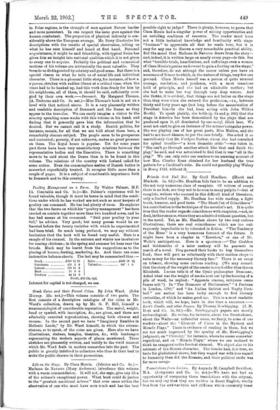Friends that Fail Not. By Cecil Headlam. (Hurst and Blackett.
3a. 6d.)—Mr. Headlam bids fair to be an addition to the not very numerous class of essayists. Of writers of essays ,there is no lack, are they not to be seen in many pulpits ?—but of essayists, writers who succeed in this difficult kind of literature, only a limited supply. Mr. Headlam has wide reading, a light touch, humour, and good taste. " The Short Cut of Coincidence " is a contribution to the technique of the novelist's art. It is quite true that the reader regards coincidences with suspicion,—not, in- deed, in the romance, where they are admitted without question, but in the novel. Yet, as Mr. Headlam shows by two very curious illustrations, there are real coincidences which are too out- rageously improbable to be tolerated in fiction. "The Tendency of the Muse" is a very humorous forecast of the future. It might have been a chapter in "Erewhon," or one of Mr. Wells's anticipations. Here is a specimen :—" The Crabbes and Goldsmiths of a later century will be gourmets in search of a novel. They pawned their books to buy themselves food; these will part as reluctantly with their mutton chops to raise money for the necessary literary fare." There is an essay on tobacco, showing some curious reading. (We may remark that the story of the weight of the smoke is much older than Queen Elizabeth. Lucian tells it of the Cynic philosopher Demonax. Asked what was the weight of smoke sent out by the burning of a pile of wood, he replied : "Appends cineres, reliquum comae fumus erit.") In "The Humours of Dictionaries," "A Parisian in London, 1789," and "An Italian Satirist and Rugby Foot- ball" our author has been lucky enough to find literary curiosities, of which he makes good use. This is a most readable book, which will, we hope, have in due time a successor.— Love's Cradle, and other Papers. By Thomas Newbigging. (S. M. Dent and Co. 3s. 6d.) —Mr. Newbiggiug's papers are mostly archaeological. He writes, for instance, about the Troubadours, about the Waite—an unfamiliar name, we fancy, to some of our readers—about the " Element of Farce in the Mystery and Miracle Plays." There is evidence of reading in them, but we are not much impressed by the quality of Mr. Newbigging's judgment, on " Chivalry," for instance, where he seems somewhat superficial, and on " Miracle Plays," where we are inclined to think he exaggerates the farcical element. We object also to his estimate of the Roman character. The Greeks had, it is true, no taste for gladiatorial shows, but they waged war with less regard to humanity than did the Romans, and their political strife was far more savage.










































 Previous page
Previous page